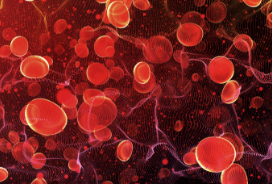C-reactive protein (CRP) is an α1-globulin predominantly synthesized by hepatocytes. It consists of five identical non-glycosylated polypeptide subunits, linked together non-covalently, forming a protein of about 115 kDa. It is composed of few or no carbohydrates.
C-reactive protein is an important non-specific defence against inflammation, especially against infections.
It is one of the most sensitive inflammatory phase proteins; its level increases by a factor greater than twenty in the case of myocardial infarction, tissue trauma, infection, inflammation, surgery or neoplasia. An increase in the concentration of CRP occurs between six and twelve hours after the inflammation, with a maximum peak at forty-eight hours. It decreases in less than six hours once the source of the inflammation is eradicated. Measurement of the CRP level is thus useful for the detection of inflammation and also for monitoring its treatment.

